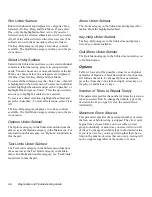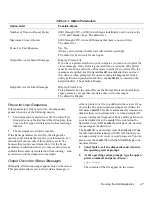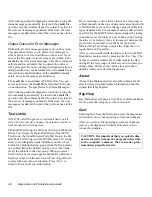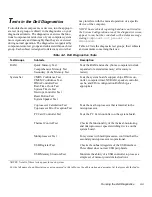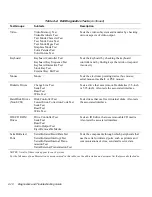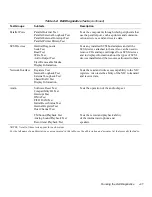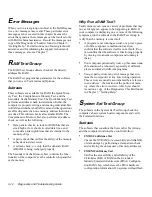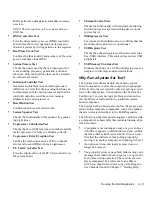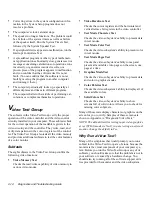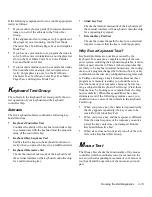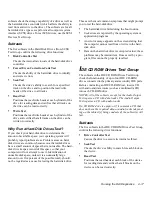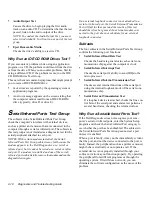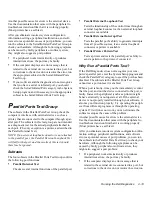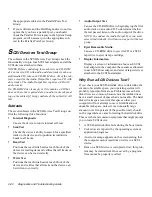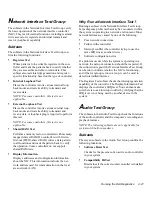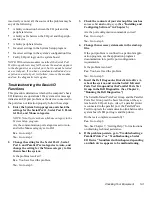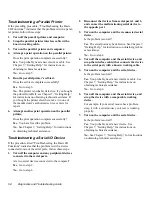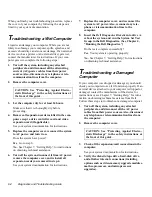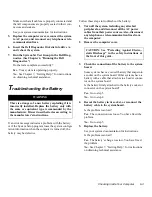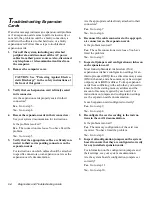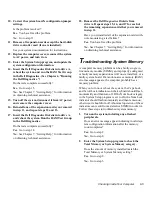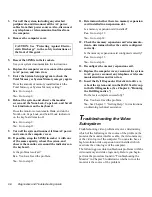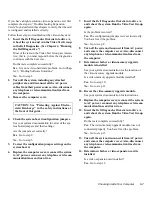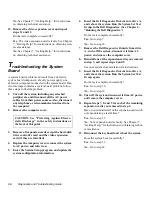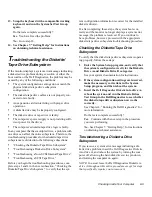
4-20
Diagnostics and Troubleshooting Guide
the appropriate subtest in the Parallel Ports Test
Group.
•
If your software and the Dell Diagnostics do not rec-
ognize that you have a parallel port, you should
check the Parallel Port category in the System Setup
program, and if necessary, run the appropriate sub-
test in the Parallel Ports Test Group.
S
CSI Devices Test Group
The subtests in the SCSI Devices Test Group check the
functionality of up to four SCSI host adapters and all the
SCSI devices attached to them.
NOTES: Before conducting these subtests on CD-ROM
drives, insert a CD with audio and data tracks (such as a
multimedia CD) into each CD-ROM drive. All of the sub-
tests, except for the Audio Output Test, require a CD with
data tracks. The Audio Output Test requires a CD with
audio tracks.
If a CD-ROM drive is empty or if it contains a CD that
does not have the required data or audio tracks (depend-
ing on the subtest[s] being conducted), the subtest(s) will
fail.
Subtests
The seven subtests in the SCSI Devices Test Group con-
firm the following drive functions:
•
Internal Diagnostic
Causes the device to run its internal self-test.
•
Seek Test
Checks the device’s ability to search for a specified
track on the device and to position its read/write
heads to all tracks.
•
Read Test
Positions the read/write heads at each block of the
device for reading data and verifies that all tracks on
the device can be read correctly.
•
Write Test
Positions the read/write heads at each block of the
device and verifies that all tracks on the device can
be written to correctly.
•
Audio Output Test
Causes the CD-ROM drive to begin playing the first
audio track on an audio CD. To determine whether
the test passed, listen to the audio output of the drive.
NOTE: To conduct the Audio Output Test, you must
select it individually. It will not run as part of the test
group.
•
Eject Removable Media
Causes a CD-ROM drive to eject its CD or a SCSI
tape drive to eject its tape cartridge.
•
Display Information
Displays a screen of information about each SCSI
host adapter in the computer, the resources allocated
to each SCSI host adapter, and a list of target devices
attached to the SCSI host adapter.
Why Run a SCSI Devices Test?
If you check your SCSI hard-disk drive to determine the
amount of available space, your operating system will
probably report problem areas. Problem areas on hard-
disk drives are common, because most hard-disk drives
have a small amount of space that is not usable. The hard-
disk drive keeps a record of this space so that your
computer will not attempt to use it. Identification of
unusable disk space, unless it is an unusually large
amount (over five percent of the possible total), should
not be regarded as a cause for testing the hard-disk drive.
These are the most common symptoms that might prompt
you to test a SCSI device:
•
A SCSI hard-disk drive fails during the boot routine.
•
Seek errors are reported by the operating system or
application programs.
•
An error message appears on the screen stating that
the computer cannot read from or write to a SCSI
device.
•
Data on a SCSI device is corrupted or lost; this prob-
lem may be intermittent. Once saved by a program,
files cannot be properly recalled.
Содержание OptiPlex HUB
Страница 1: ... 1267 6 1 7528 6 227 1 8 ...
Страница 2: ......
Страница 3: ... 1267 6 1 7528 6 227 1 8 ...
Страница 10: ...x ...
Страница 18: ...xx DELL CONFIDENTIAL Preliminary 2 10 98 ...
Страница 20: ...xxii DELL CONFIDENTIAL Preliminary 2 10 98 ...
Страница 38: ...2 14 Diagnostics and Troubleshooting Guide ...
Страница 42: ...3 4 Diagnostics and Troubleshooting Guide ...
Страница 88: ...6 20 Diagnostics and Troubleshooting Guide ...

